
You might not have noticed it, but gaming has a problem. It used to be kind of a small problem, but over the years, it has become more and more noticeable. But it’s not the sort of thing the average gamer thinks about, or indeed the average person. In fact, if you just buy games off the shelf and play them, you might never see what’s happening behind the scenes, but the fact of the matter is that video games are mainstream now. The content within them matters. It has an impact. It makes a difference what that content is and who can buy it. We’ve seen article after article about the impact violence in gaming has and doesn’t have (it doesn’t have one, let it go ridiculous politicians) on kids. We’ve talked about Grand Theft Auto. We’ve maligned the breast physics of the DOA series. Yeah, that’s a thing. I myself have reviewed some of the most questionable content ever for this site, including the incredibly outrageous Omega Labyrinth Life (take a look here if you don’t believe me).
Over the last 5 years or so, the volume of content available to gamers has accelerated at a breakneck pace, and the real issue is that we put out and monetize content so incredibly fast that we’re not really looking at it anymore. Why is this a problem? Well, maybe you should be the judge of that. Let’s take a look at a couple of examples. They illustrate the issue with gaming content far more bluntly than I can.
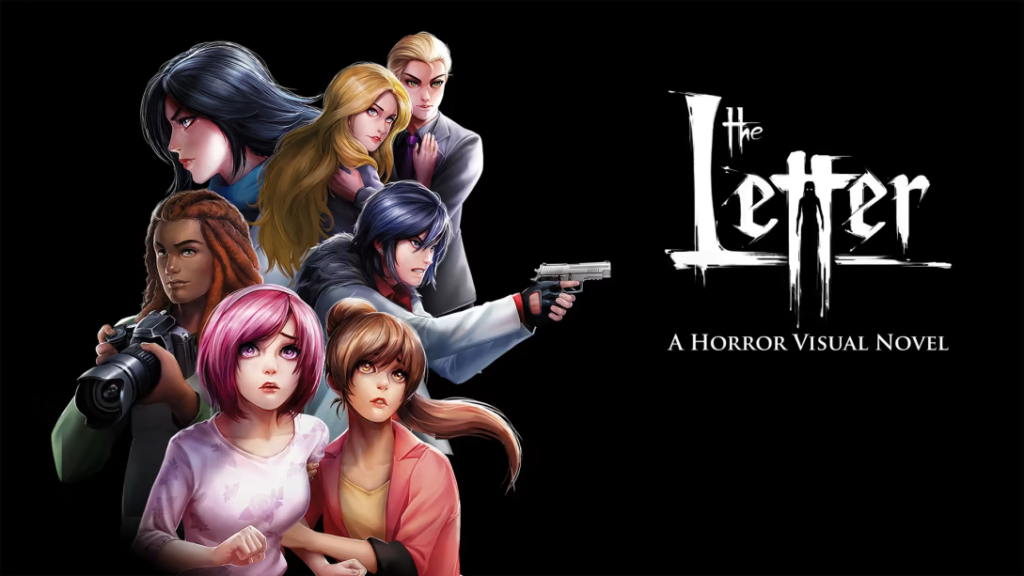
First up is a game called The Letter from publisher East Asia Soft and developer Yang Yang Mobile which I recently received a review copy of for the Nintendo Switch. This is a horror visual novel in which a real estate agent in Cardiff, Wales is trying to sell a haunted mansion and incurs the wrath of an angry ghost. It’s well-written, interesting, and complex, with hundreds of branching story pathways, disturbing imagery, relationship options and a whole lot more. It also has the N-word. Now, I’ve been gaming a long time, and not once have I ever encountered the N-word in a game before. But The Letter goes further than that. Not only does it have the N-word, it has it recorded in fully voiced audio, spoken with such vitriol that you’re expecting a white hood to show up at any moment. And on top of that, it has absolutely nothing to do with the story. There’s no reason for this content to exist, and yet it does.
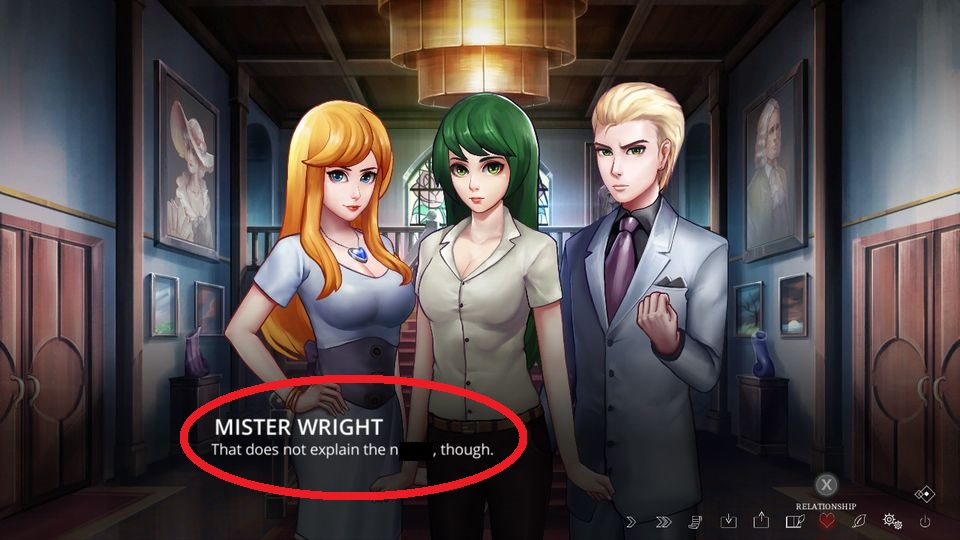
To put things in context, the main character of the first chapter, Isabella, has enlisted the help of her friend Zach, a black man with dreadlocks and a pleasant, relaxed demeanor. Zach has called a friend of his, a priest, to help bless the house and rid it of the spirit but the new owners are there and question the trio about their presence. The rich white man that now owns the house deliberately and loudly calls Zach the N-Word and is chastised by his wife, but there’s no reason for this. This is current-day Cardiff with upper-class British characters. Worse still, Zach says nothing and just takes it. The priest says nothing. It’s just essentially accepted as bad behavior. This is script-writing that has absolutely gone off the rails and for no reason whatsoever.
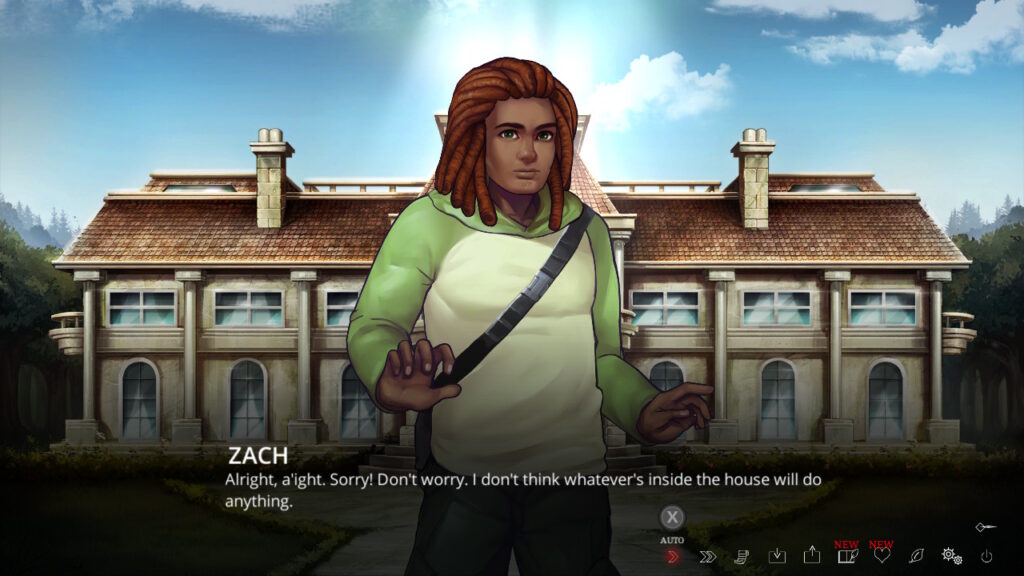
We reached out to East Asia Soft and they stated that they were unfamiliar with this portion of the script. They provided the following statement:
“We were previously unaware of this inclusion in the game’s very lengthy script. Seeing it now, it seems in context that the comment is spoken by an unsavory character and is immediately treated as unacceptable behavior even by the other characters in the dialogue. Regardless, its presence does not mean we condone the language itself, and we are further looking into the matter.”
The problem here isn’t just the presence of the N-word though. It’s that this made it out of Yang Yang Mobile, through East Asia Soft’s quality checking, and out to the West. It gets worse though. The Letter has an ESRB (Entertainment Software Ratings Board) rating of M. That means that the ESRB thought that it was fine to allow this content through. The game is available on the Nintendo Switch eShop and the Xbox Store and physical copies are already in production. It’s also currently slated for release early next year on the Playstation. This puts the game into potentially millions of homes across the world and it’s been on Steam since 2017 with almost a thousand reviews and a “Very Positive” rating. It should have that, because it’s a fantastic game. But no one has mentioned this. And there’s no possible way that it has entirely escaped notice for this long because it’s not all that hard to get to this part of the game.
We all know that the ESRB isn’t looking all too hard at games. There’s just too much content and paying someone to analyze every bit of text in every game would be insanely expensive, especially with the number of hours in everything. But there’s a point where that becomes a problem and that point is when a current-day white character is disgustedly speaking the N-word to a stoic black character in a game in the very first chapter. But Nintendo didn’t catch it either. And Microsoft didn’t catch it. And Valve didn’t catch it. And East Asia Soft didn’t catch it. And a voice actor spoke those lines and they were recorded and it wasn’t questioned. Sure, this isn’t a triple A title from a major studio, but it does have worldwide distribution and the genre is growing in popularity. And that’s a big problem if we’re accepting this kind of content on platforms.
Now, sure, it’s easy to say that this is one single instance, a fluke. But go ahead and name another game that speaks the N-word out loud with a voice actor. I’ll wait. Still waiting. Yeah, that’s what I thought. As of the writing of this article, I am unaware of a single time that this has ever happened in gaming before. Questionable content? Sure. But this? Never. And that’s the problem. We’ve always stopped content like this from getting out because not only is it not appropriate, it’s dangerous. These ideas casually thrown into a game get into the collective unconscious and normalize and with the rise in racism in the United States, we simply can’t accept content like this. At all. It would be unfair to attribute motivations to the content here, but I’d like to think this was a mistake in translation or an oversight that just slipped through. Maybe it is. Maybe it isn’t. It doesn’t matter, because this should not happen in gaming.
Don’t get me wrong here. Adult games are not the issue. Adult content is not the issue. Anyone who follows indie gaming is fully aware that there are a wide variety of mature and even blatantly sexual games available, especially on the PC. Since the release of the Switch, Nintendo has also released more and more uncensored content. And games are remarkably violent, sometimes artistically, sometimes simply brutally. But there’s no difference between that and a horror novel or a horror movie. Or a movie focused on sexual relationships. Or even pornography for that matter. Just like any other media, video games range from target audience of pre-schoolers all the way up to X-rated adult content and that’s fine. Could we make a game based on the Tulsa Race Massacre of 1921 for example? Sure, and it would be both wildly inflammatory and would assuredly contain the N-word. The context would be different though. As media, we think of games as for kids but they don’t have to be and realistically, they shouldn’t be. However, we need to be careful how we are using words, phrases and imagery and we’re definitely not doing that. See if you can tell what I mean with the next game.
Let’s look at one more game, another visual novel. Now I review a lot of these things. I like the genre. Some of them are terrible, some are great, some are wildly sexual and questionable. I recently reviewed a game for the Switch called Shinrai – Broken Beyond Despair here on the site. It’s another horror visual novel, this time from publisher Ratalaika Games and developer Gosatsu Visual Novels. Shinrai is available on Steam, Switch, Playstation, and Xbox. It tells the story of a 14 year old girl going to a Halloween party.
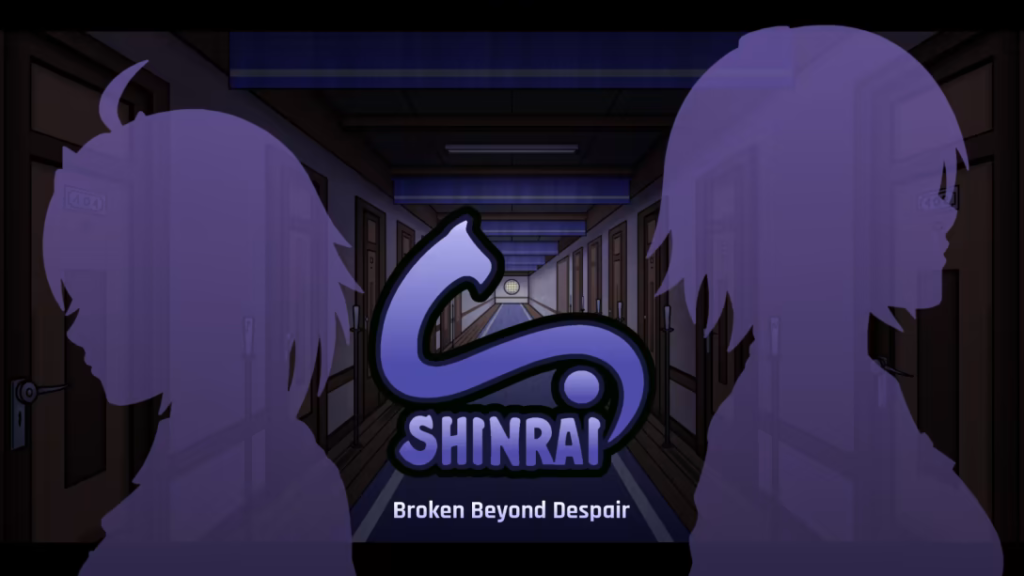
However, there’s a bit more going on here than you might expect. Turns out there are ten kids at this party, four guys and six girls. All the girls are 14-15 as shown in their in-game bios. The guys are all 15. Now, that in and of itself wouldn’t be a problem except for the fact that the content of the game is so incredibly vulgar that the screen captures had to be censored for publication in the review. The boys blatantly talk about their genitals and masturbation, how they want to have sex with the girls, and more. The game is beyond explicit. On top of that, one of the characters is in an abusive relationship with his girlfriend, telling her how stupid she is and verbally abusing her and the other children at length in the game. But it’s the underage sexual content that really makes Shinrai inappropriate.
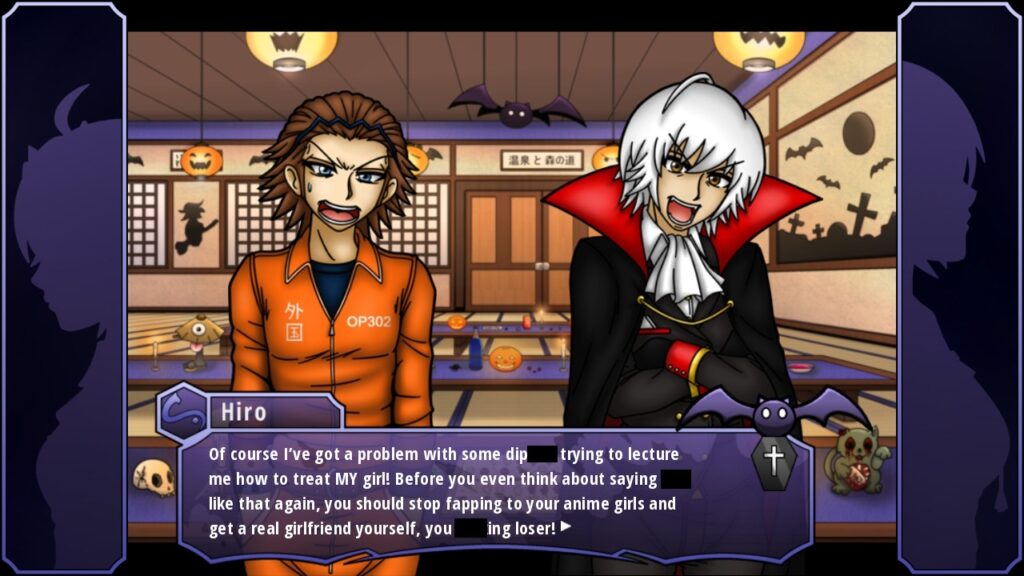
Sexual content with declared underage girls is simply not acceptable in video games. It’s not acceptable in movies. It’s not acceptable at all. Sure, anime and manga definitely toe the line a lot and it’s quite questionable. We all know it. But it’s never declared. It’s never this blatant. This is too far. And Shinrai isn’t pushing boundaries, it’s crossing a line. But again, this isn’t just about Goasatsu. It’s about Ratalaika not noticing what they’re publishing. It’s about the ESRB handing out a rating of M to a game with underage sexual content. It’s about every single major platform making this game available and handing it out to the press. I reviewed it and while I mentioned this, in retrospect I didn’t go far enough in condemning it. It’s about the “Very Positive” rating that Shinrai has on the Switch that entirely fails to mention the content in any review; the screenshots that purposely hide the content so players don’t know what they’re getting into. This. Is. Problematic.
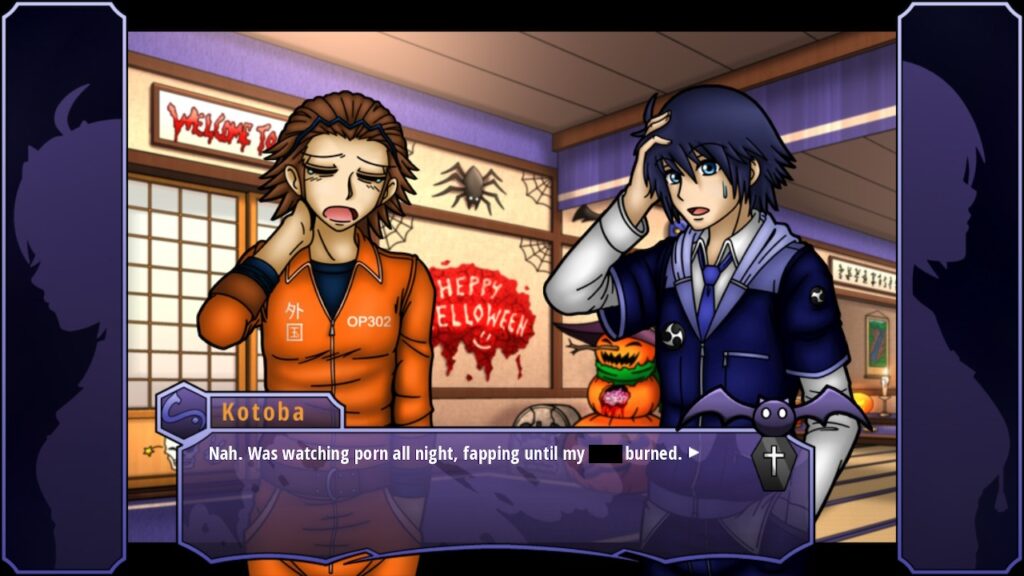
We are living in one of the most volatile times in recent history. Gaming is one of the most mainstream entertainment formats and generates billions of dollars of income for massive corporations around the world. But it’s the size of it all that’s starting to let cracks show. “We can’t look through every bit of a script” isn’t a good excuse to allow underage sexual content or blatantly racist language in a game. For all the hits it’s taking from all sides, the video game industry as a whole needs to be better than this. The developers need to take a moment and think. The publishers need to revise their review processes. The major game companies need to review content sold on their platforms thoroughly, whether it be first or third party.
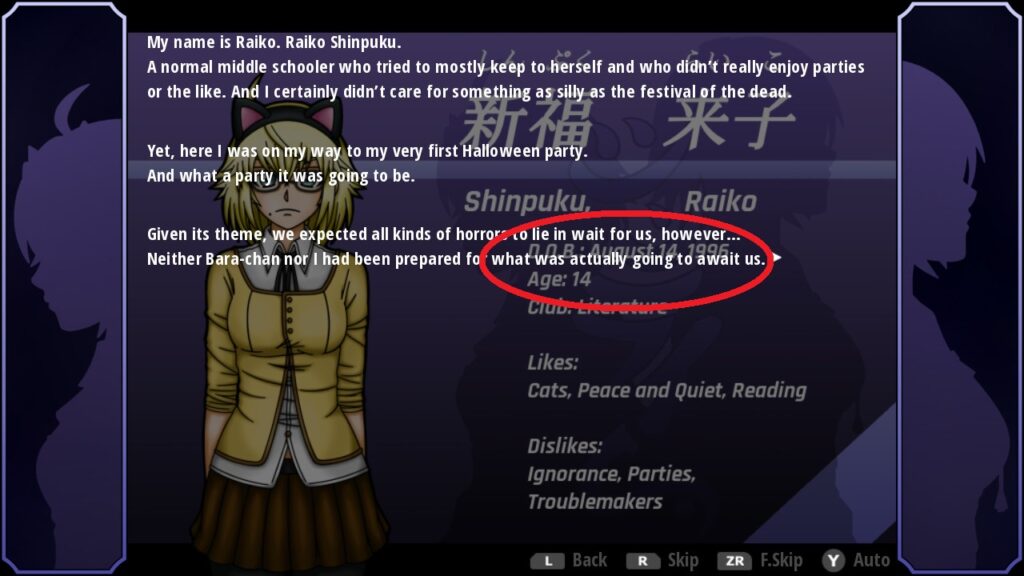
As a gamer, I love video games. I like the silly fun ones. I like the violent and disturbing ones. I like the romantic stories and even some of the questionable ones. Gaming is fun, just like reading and movies. But staying silent about the N-word in a game or underage sexual content isn’t something that we should do. I won’t. You shouldn’t. We need to make sure that gaming stays better than this across the board under the incredible press of content that is releasing. And we need to be better. Because we can be better than this.
I’d like to leave you with one final thought. With all of the protests and shootings, riots and the pandemic, everyone is angry. Everyone is tired. Everyone just wants to escape and relax and gaming is a great way to do that. But we need to be vigilant in our consumption of not just games but all media. We need to be careful what’s available to our children. They shouldn’t be watching Squid Game and The Walking Dead, but they are. They shouldn’t have access to pornography on phones in grade school but they do. And they shouldn’t have this type of content in their games, especially because not every child’s media consumption is regulated. We cannot afford to normalize this. Let’s all have fun with our games, but let’s pay a little more attention, both corporations and consumers. We’ll all be better for it.

